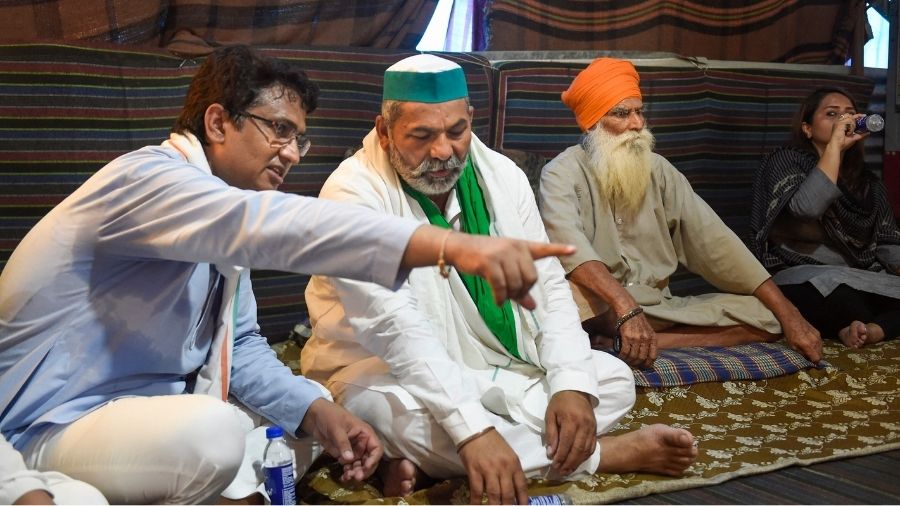Still strong
Sir — It is uncharitable to say that the Bharat Bandh called by the farmers’ unions has caused ‘disruption’ or ‘inconvenience’ for the public since it is a question of survival for those who produce food for the entire nation. The spirit with which they are protesting reveals the intensity of their concerns over the three farm laws. The support extended by the Opposition parties should not be seen merely as an attempt to pander to the farmers, even though elections are around the corner in some states. The Opposition’s actions could also be read as a show of solidarity. The rhetoric employed by certain parts of the media betray their stand in favour of the government. The attempt to pit the protesting farmers against the ‘common citizens’ is eminently avoidable.
One plausible explanation for the protests being looked upon with such callousness by the current dispensation is that as a right-wing, Hindutva-oriented party that represents the interests of upper castes, it is indifferent to the farmers’ lot. Yet, one would like to urge the Narendra Modi government to nurture some sense of empathy for the farmers and repeal the farm laws in national interest — after all, the term, ‘nation’, is bandied about by the Bharatiya Janata Party.
G. David Milton,
Maruthancode, Tamil Nadu
Sir — It is ironic that the prime minister who boastfully declared India to be the ‘mother of all democracies’ at the United Nations was welcomed back to the country with a national strike against the anti-democratic stance of his government. The Bharat Bandh could have been avoided had the government been committed to healthy democratic traditions — the issues that led to the strike could have been resolved by means of peaceful discussions with the stakeholders. Moreover, the labour code, rising prices, the monetization scheme and other important issues that merit discussion were not given enough time in Parliament.
Although the Opposition must bear some blame for the state of affairs in Parliament, the primary responsibility of ensuring discussion lies with the treasury benches. The space for the expression of opposing voices is shrinking. Elections are losing their sanctity on account of money power. All this points to the fact that one can, of course, claim that India is the ‘mother of democracy’, but one cannot assert that she is well taken care of.
D.V.G. Sankararao,
Nellimarla, Andhra Pradesh
Sir — The stalemate between the Centre and the farmers has now continued for a year. The latter’s call for a Bharat Bandh reveals their determination to take the fight against the government further. The farmers have demanded that the laws be repealed and have stated that they will not accept a compromise. They also have the support of six state governments; Kerala, Punjab, Chhattisgarh, Rajasthan, Delhi and West Bengal have passed resolutions against the farm laws. It remains to be seen which side blinks first.
Gundu Maniam,
Ghaziabad
Sir — The Centre’s indifference in the face of the crisis faced by the farmers is chilling. If it indeed has the interests of the farmers in mind, there is no reason for it to be adamant on not repealing the laws that the farmers are fighting against.
Shashank Gupta,
Mumbai
Well done
Sir — Iceland almost became the first nation to have a female-majority Parliament. Sweden, too, has a rather balanced legislature with 47 per cent of women parliamentarians. Gender-based reservations have paved the way for this. If developed countries need reservation to give women their due, how can India expect to achieve equality when the women’s reservation bill is yet to be passed in Parliament?
Yashi Bairagi,
Ujjain
Sir — Iceland must be lauded for sending a record number of women to Parliament.
Zeba Akhtar,
Pune
Old tricks, new tools
Sir — Indians may lack many skills, but imagination is not one of them. Several candidates taking the Rajasthan Eligibility Examination for Teachers were found using ‘Bluetooth chappals’ — slippers with Bluetooth devices connected to an earpiece — in a bid to qualify for a job in a government school. Some of these slippers may even cost two lakh rupees a pair. Amusing as it may seem, the incident underlines the threat that such practices pose to education in India. One shudders at what kind of lessons such candidates will impart to their students if they do succeed in becoming teachers.
Rajib Sanyal,
Calcutta











